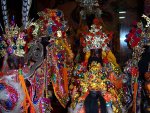- East Asia’s “Post-Confucian” societies
- Chu Hsi (Zhu Xi) emails
- MM as Confucian, Neo-Confucian and Post-Confucian
- Confucianism in 21st-century Chinese academic discourse
APPENDIX 1: Confucius and the Classic Texts
APPENDIX 2: Confucianism in early 20th-century China
Confucian, Neo-Confucian, Post-Confucian MM
The final two pages of MM’s China, titled “Critique,” comment on a five-act “play” of his, based on a plot outline of West Wing Story (Hsi-hsiang chi), the traditional Chinese drama. Mention is made of MM’s other five “Chinese” books: Revolution, a collaborative work, whose original Chapter 2 treats Confucianism humorously (see Lun Hui, Chapter 1 for a Chinese translation); Engendering,1, which interweaves the Analects into a section of the book that includes scenes with Professor Morrison’s American students; Exists, Regarding and All, three landscape books that model their descriptions of Oklahoma, New Mexico and Arizona (USA) respectively on Yuan, Sung and Ming literati ink brush landscape types.
Excelling describes a trip to Shanghai, Congqing, Chendu, Kunming and Guangzhou. Though still deeply Confucian, 20th- and early 21st-century China has progressed through various other ideologies, from Marxist-Leninist to Maoist to Market Socialist to Capitalist, the last in concert with other East Asian countries. In the following the primary text is drawn from the work of MM’s mentor in Chinese literature, James J.Y. Liu (born in Beijing but transplanted to the USA, where in 1980 Professor Morrison studied with him at Stanford, in a National Endowment for the Humanities Seminar). The secondary text reflects upon MM’s own books about China. Like Excelling (2001), MM’s China (2007) is Post-Confucian.
Critique
As the synopsis suggests, the dramatist’s main interest is not in presenting action but in expressing the lovers’ changing emotions. Thus do we look back upon our experience of China. For instance, the dramatic events of the siege of the monastery and the lifting of the siege are crowded into one induction. Narrow though it be. Yet whole acts are devoted to the expression of the emotions of one or the other of the lovers, with little action. And limited by our contemporary, foreign and prejudiced perspective. Throughout the drama Chang experiences a whole gamut of emotions: Beijing today. Rapture, disappointment, hope and doubt, sorrow of separation, longing for the absent one, indignation and final happiness. Though the capital. The intensity of his emotions may seem excessive to us. From which Jen, in the second chapter of Revolution had left Ancient China for the Paris of 1975. (We should remember, however, that in a society that did not allow young men and women to mix freely.) Seems hardly the center of China. (When they did have a chance to meet, their temptations were so much the greater and their passions so much the more intense.) Much less of Asia or the universe. Although Chang is hardly a hero by western standards. At least no more so than Delhi or Tokyo or London.
He shows some independence of character by his total devotion to love and his defiance of conventional morality. The Shanghai that we have revisited bears the same name as the city of 1992 (represented in Excelling) and of 1946 (represented in “MM’s China”). In fact, he even makes use of conventional morality to further his amorous goal: But here the similarities end. (He pretends that he needs a room so that he can study for his examinations in a quiet environment, and he pretends that it is his filial devotion to his dead parents that prompts him to join the mass, when in fact he is only seeking an opportunity to be near Ying-ying.) Chengdu from present perspective certainly represents a different experience from author and Taiwanese companion’s first encounter with professor, writer and director. Chang’s complete absorption in love suggests that it is possible, if only temporarily, to neglect society and live in a world of one’s own. Likewise the landscapes of Excelling are far distant from those of All, Regarding and Exists. Though not sanctioned by tradition like the time-honored withdrawal from society, sexual love seems to provide another escape from society, even if this escape surely cannot last. And also from their models, or “subtexts,” in the Ming, Sung and Yuan literati painters.
Ying-ying is at first not as single-mindedly in love as Chang, for she is torn between a wish to conform to conventional morality and gratitude toward her lover. Nor is there much of Confucian or Taoist import in these studies of the landscapes of Arizona, New Mexico and Oklahoma, as was explicit in the text of Engendering. This conflict within herself leads to seemingly inconsistent behavior and to her abrupt changes of mood. Although landscape here as a subject of contemplation must bear some relation to the reflective and artistic practices of the Chinese, transmitted to the West in the form of landscape gardening. Once she has had sexual relations with him, however. With its natural, irregular contours. She loves him wholeheartedly, while at the same time being sensitive to her vulnerable position as a girl who has lost her “virtue.” Which so influenced the English. In a society that sets a high value on virginity and endorses a double standard of morality for men and women. Engendering’s Norman, Oklahoma in turn seems distant. This accounts for her repeated pleas that her lover not desert her for another. From the Chinese, French and even American settings elsewhere in Revolution. Which thereby induce our sympathy and make her seem more than simply a stereotyped beauty.
Looking backwards is easier than looking forwards. In addition to the two lovers, another successfully portrayed character is the maid Hung-niang. Assigned the singing role in several acts, she emerges as a full-blooded and attractive personality. Resourceful, witty, loyal, courageous, empathizing with the lovers while laughing at their moonstruck passion, she forms a link between their private world of romantic love and the public world of humdrum reality. The retrograde vision is less demanding than the progressive. She brings the principals together as secret lovers and persuades Madame Ts’ui to let them marry. Practical and commonsensical herself, she is nonetheless capable of understanding the couple’s romantic passion. To keep its eye on the present alone is more than humankind seems capable of. Apart from her role of bringing the lovers together, Hung-niang also functions as a chorus, commenting on love and inviting us both to sympathize with and to laugh at the lovers. The present is here and now, but “now” quickly becomes the past, or the future, and “here” as well quickly becomes “there” or “elsewhere.”
Some critics have severely condemned the final part of the drama with its happy ending, but it is difficult to see how this could have been avoided. Like the animal that he is. Theatrical conventions apart, there are several reasons why the play should have ended happily. Or once was. For starters, in the original story there is no compelling reason for the hero to desert the girl, and now that in the drama she is explicitly identified as the daughter of a former chief minister, there is even less reason for the young man not to marry her. Or should be. Moreover, Tung’s narrative Western Chamber, on which the play is based, ends happily, and since the drama follows the narrative quite closely, it is very unlikely that the dramatist intended an unhappy ending. Man abides in the here and now. Moreover, the structure of the play shows more affinity with western comedy than with tragedy. The basic pattern of comedy Northrop Frye once summarized as follows: “Normally a young man wants a young woman, his desire is resisted by some opposition, usually paternal, and near the end of the play some twist in the plot enables the hero to have his will.”
The elderly live in the past. West Wing Story agrees with this pattern, except that the opposition comes from the heroine’s mother, not from her father. For they are mentally or biologically senile. Parts I-IV do not foreshadow a tragic ending. Or both. In language the play varies from sublime poetry to bawdy slang (like Shakespeare’s Romeo and Juliet). Political and religious people live in a future. Poetic imagery is used as a means to fulfill various vital dramatic functions: In which they have ceased to exist. It expresses the imagined emotions of the main characters, depicting what could not be realistically presented on the stage (for example, love-making, described here in such poetic images as “dewdrops falling into the opened-up peony”) and provides a symbolic understructure for the dramatic action. Man is bound to the present. Though formerly condemned for its erotic passages. Bound to live within it. West Wing Story is nowadays recognized as a masterpiece of poetic drama. Like a healthy animal. And a paean to sexual love. Like a young man, ever renewed in the moment, ever in love with his Other and with himself.
Confucianism in 21st-century Chinese academic discourse


